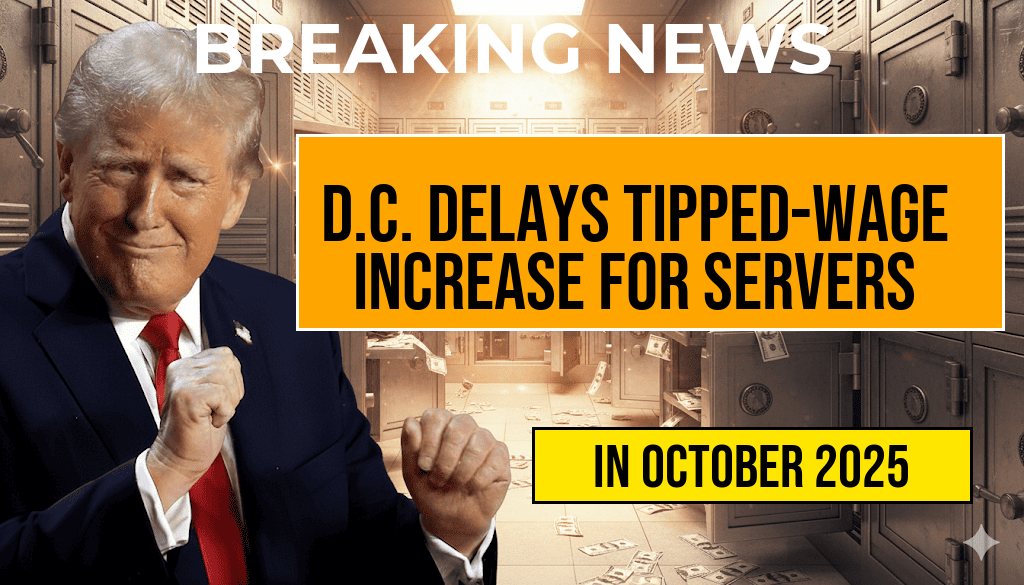The District of Columbia has announced a delay in the implementation of its much-anticipated $2 increase to the tipped wage, a move that could significantly impact the earnings of service industry workers. Initially slated to take effect on July 1, 2023, the wage increase has now been postponed until at least 2024, leaving many servers and bartenders to face a potential annual loss of approximately $4,160 compared to the original plan. This decision comes amid ongoing debates about the balance between supporting workers in the hospitality sector and the financial viability of local businesses still recovering from the pandemic.
Understanding the Tipped Wage Structure
The tipped wage system allows employers to pay their workers a lower base salary, with the expectation that tips will make up the difference. In D.C., the current tipped wage stands at $5.60 per hour, significantly below the standard minimum wage of $16.10. The proposed increase aimed to elevate this wage to $7.60, thereby enhancing the financial security of workers whose income is largely dependent on gratuities.
Impact on Service Workers
For many service workers, the increase represented a crucial step towards fair compensation. The delay means that these employees will continue to earn less compared to their counterparts in states with higher tipped wage standards. According to estimates, the postponed increase could result in a loss of over $4,160 annually for full-time servers, exacerbating financial strain in an already challenging economic landscape.
Key Reasons for the Delay
- Economic Recovery: As businesses continue to recover from the pandemic, there are concerns about the potential financial impact of increased wages on small businesses.
- Industry Pushback: Many restaurant owners have voiced their opposition to the wage hike, arguing that it could lead to increased prices for consumers and reduced hiring.
- Legislative Considerations: D.C. lawmakers are weighing the long-term implications of the wage increase, seeking a balance between worker rights and business sustainability.
Voices from the Community
The decision has drawn mixed reactions from local stakeholders. Advocates for workers argue that the delay undermines the efforts to create a more equitable wage structure in the hospitality sector. “Every day we work hard to provide exceptional service, and we deserve to be compensated fairly,” said Maria Gonzalez, a server at a popular D.C. restaurant. “This delay feels like a setback for all of us who rely on tips to make a living.”
On the other hand, some restaurant owners express concerns about the feasibility of implementing higher wages amid ongoing supply chain issues and inflation pressures. “We’re still trying to navigate the post-pandemic landscape,” noted John Smith, owner of a local eatery. “An increase in labor costs could force us to raise menu prices, which might deter customers and hurt our business.”
Looking Ahead
As the district prepares for the revised timeline of the wage increase, many are calling for more comprehensive discussions about fair pay and the future of the tipped wage system. Stakeholders are urged to engage in constructive dialogue that considers both the needs of workers and the realities of running a business.
Potential Solutions and Alternatives
- Gradual Implementation: Some suggest a phased approach to wage increases to allow businesses time to adjust.
- Support for Small Businesses: Increased financial assistance or grants for small businesses could help mitigate the impact of wage hikes.
- Improved Training Programs: Investing in training for workers could enhance service quality and potentially increase tips, benefiting both employees and employers.
Conclusion
The decision to delay the $2 tipped-wage increase highlights the complexities of labor policy in a post-pandemic economy. As D.C. navigates these challenges, the focus will likely remain on finding a balance that supports workers while ensuring the sustainability of the local business landscape. More discussions are expected in the coming months as stakeholders work toward a consensus on how best to move forward.
| Wage Scenario | Annual Earnings (Estimated) |
|---|---|
| Current Tipped Wage ($5.60/hr) | $11,680 |
| Proposed Tipped Wage ($7.60/hr) | $15,840 |
| Potential Loss Due to Delay | $4,160 |
For more information on the tipped wage system, visit Wikipedia or read insights from Forbes.
Frequently Asked Questions
What is the proposed tipped-wage increase in D.C.?
The proposed tipped-wage increase in D.C. aims to raise the minimum wage for servers and other tipped workers to better reflect their actual earnings and living expenses.
How much could servers potentially lose annually due to the delay?
Due to the delay in the tipped-wage increase, servers could potentially lose up to $4,160 annually compared to the original plan that was set to take effect.
What factors led to the decision to delay the wage increase?
The decision to delay the wage increase was influenced by various factors, including economic conditions, feedback from local businesses, and discussions within the D.C. government regarding the impact on the hospitality industry.
When is the new timeline for the tipped-wage increase expected?
While no specific timeline has been provided, city officials are working to establish a new schedule for the tipped-wage increase after reviewing the current economic landscape and stakeholder input.
How does this delay affect the overall wage structure for tipped workers?
The delay in the tipped-wage increase could maintain the current wage structure for tipped workers longer than anticipated, which may affect their overall earnings and financial stability until the increase is implemented.






